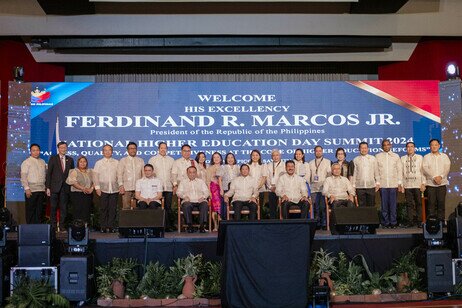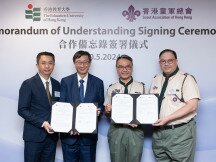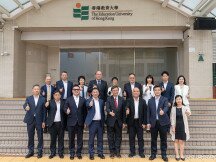EdUHK Deepens Collaboration with ASEAN Countries Promoting Educational and Cultural Exchange under the Belt and Road Initiative
The Education University of Hong Kong (EdUHK) has long been committed to promoting educational development in Belt and Road countries. In May this year, a delegation led by Professor John Lee Chi-Kin, President of EdUHK, and Professor Lo Sing-kai, Associate Vice President (Internationalisation), visited Brunei and the Philippines and forged collaborations. In addition to further implementing its internationalisation strategy, the visit has demonstrated the University’s consolidated influence in ASEAN countries.
On 13 May, the EdUHK delegation first visited Brunei and met with Datin Seri Setia Dr Hajah Romaizah binti Haji Md Salleh, Minister of Education of Brunei Darussalam, sharing the successful cooperation models that EdUHK has developed with other ASEAN countries. The Ministry conveyed that they will visit EdUHK in the future to engage in dialogue with experts in various disciplines to promote bilateral educational collaboration. Both sides expressed excitements for the collaboration.
The delegation also visited Universiti Brunei Darussalam (UBD), the country’s top university. EdUHK and UBD had coorganised enriching workshops and seminars in Brunei in March this year, identified two key areas for collaboration: early childhood education and special needs and inclusive education, and explored further collaboration. After two months of proactive discussions, the two sides formally signed a Memorandum of Understanding during this visit to establish a foundational framework for deepening future academic exchanges, research cooperation and teacher education, marking a significant milestone in their partnership.
The delegation visited the Philippines on 15 May and attended the National Higher Education Day Summit. Philippine President Ferdinand Marcos Jr delivered a speech emphasising the core role of education in national development. The summit brought together government officials and education experts in the Philippines, including Executive Secretary Lucas Bersamin, Commission on Higher Education Chairperson J. Prospero De Vera III, and Senate Committee on Education Chairperson Chiz Escudero, among others.
Professor Lee was invited to deliver a keynote speech at the summit, sharing EdUHK’s latest developments from an international perspective, including its work in academic quality assurance, enhancing students’ global competitiveness through educational innovation, as well as its achievements and future plans in international exchange and collaboration.
He also expressed his anticipation for further collaboration with Philippine institutions to jointly promote educational development in the region. His participation not only demonstrated EdUHK’s leading position in international educational collaboration, but also deepened its ties with ASEAN countries, laying the foundation for future partnership.
The Belt and Road initiative is an important development strategy of our country. Over the years, EdUHK has actively promoted educational collaboration with ASEAN countries, establishing partnerships with institutions in the Philippines, Myanmar and Indonesia, among others. For instance, EdUHK was commissioned by the World Bank in 2017 to provide consultancy services for the Vietnamese Ministry of Education and Training, with the objective of promoting the continuous professional development of teachers in Vietnam. EdUHK also joined World Bank’s “Higher Education Improvement” project to build the capacity of higher education teachers to enhance access to quality education in Cambodia.
Professor Lee, who also serves as a UNESCO Chair in Regional Education Development and Lifelong Learning and a Research Fellow of the Southeast Asian Ministers of Education Organisation (SEAMEO), summarised that as EdUHK continues to prioritize educational development, research and innovation, it aims to leverage its resources, global network, expertise and advantages to strengthen educational collaboration with more ASEAN countries, jointly addressing common challenges and improving education quality, consistently raising its profile and impact locally, regionally and internationally.






